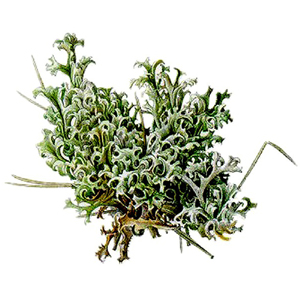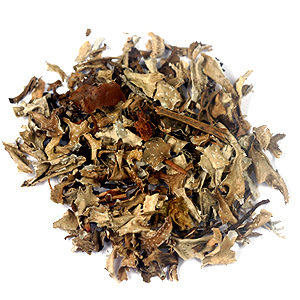No products
Iceland moss - 50g
(Lichen islandicus)
Iceland moss (Lichen islandicus) improves digestion, used for inflammation in the oral cavity and in inflammation of the upper respiratory tract. It is suitable for catarrh, asthma and stomach problems...
![]()
Content |   |
Binomial nameLichen islandicus Commonly called (often known as)Cetraria islandica StorageStore in a dry place at a temperature up to 25°C |
Description of herb
The Iceland moss (Lichen islandicus) grows in mountainous landscapes on heathery soil, on moist wooded hills between moss and grass.
Because it is one of the best natural antibiotics, it is also called natural penicillin, which is effective against many pathogenic bacteria and viruses.
It can also inhibit (though unfortunately not stop) the growth of the HIV virus and eliminate Helicobacter pylori.
It can be used alone or in mixtures with other herbs (Mallow bloom, Hyssop, Marigold) and not only for its antibacterial and antiviral properties.
Healing effects
Internal action
Mucilages protect the mucous membranes of the digestive tract, bitter acids improve appetite. The use of these substances is very suitable for dry irritating inflammations of the oral cavity, throat and inflammatory diseases of the digestive system.
Bitter-tasting lichen acids help to secrete gastric juice and digestive enzymes, thus improving digestion and nutrient absorption. They contribute to better metabolism. Lichen acids, especially fumaroprotocetraric, protolichesteric and usnic acids, have a significant antibiotic effect against many species of bacteria, thus contributing to the remediation of inflammatory diseases of the oral cavity, pharynx and digestive system. Therefore, it is used for gastroenteritis, diarrhea, gastric and intestinal catarrh. Due to its bitter substance content, it is used for anorexia (it increases the production of glandular juices and tones).
It is also an excellent means of strengthening the body during general body weakness and after exhausting diseases.
It improves appetite as it contributes to the treatment of indigestion.
Mucous substances protect the mucous membranes of the pharynx and upper respiratory tract, so it is used for airway catarrh and for obstruction. The contained polysaccharides suppress the formation of neoplasms. Due to the high iodine content, it also has a positive effect on the activity of the thyroid gland. It is used in pediatrics and geriatrics for its excellent effects.
Internal use
It is traditionally used for inflammation of the oral cavity and inflammation of the upper respiratory tract.
It supports coughing, is suitable for catarrh of the respiratory tract, pharynx and asthma.
Tea is excellent for diarrhea, gastritis and gastric and intestinal catarrh.
It is also used in anorexia to stimulate appetite, as it stimulates the production of gastric juices and digestive enzymes, thereby strengthening the activity of the stomach and thus improving digestion and absorption of nutrients and thus contributes to better metabolism.
It is most often used for dry cough, respiratory infections and congested tubes. It can be used alone or in mixtures with other herbs (Moorish mallow, Hyssop, Marigold) and not only for its antibacterial and antiviral properties. It contains carbohydrates - mucilages that have the ability to bind water and form viscous solutions, which helps dilute and cough up mucus from the tubes. During a dry cough, it forms a coating on the irritated mucous membranes, which protects them and at the same time contributes to their calming. This is also the reason why traditional medicine recommends it for bronchitis and asthma.
Preventively
It also helps preventively or with mild problems:
When irritating to cough and hoarseness
In air-conditioned rooms where dry air dries the mucous membranes of the respiratory tract
If you have to talk a lot at work and strain your vocal cords
Active substances
- 50% membrane mucus - lichenin polysaccharide (linear glucan similar to cellulose), which, however, dissolves in hot water
- Isolichenin - a polysaccharide similar in chemical structure to starch
- Lichen acids: lichester, protolichester, cetrar, protocetrar, fumaroprotocetrar, usnic
- Pectins
- Slime
- Iodine
- Vitamins A and B1
Lichen acids are added to antibiotic ointments and dusting powders due to their antibiotic effects.
Properties
Antioxidant, antibiotic, anti-inflammatory, antibacterial, antiviral, tonic, immunostimulant.
Recommended at
Per oral use helps in these diseases and troubles
- inflammation of the oral cavity, throat and digestive tract
- gastroenteritis
- diarrhea
- gastric and intestinal catarrh
- suppresses the formation of neoplasms
- thyroid disorders
- asthma
- bronchitis
When external use treats and helps in these diseases and problems
- for poorly healing wounds
Preparation and dosing
Internal use
Macerate: The macerate is prepared from 1 teaspoon of the dried plant to a cup of water by cold leaching for 8 hours.
This procedure is most gentle on slimes - carbohydrates and other substances that the plant contains and which are leached into the solution. During cooking, the slime is largely decomposed and thus destroyed.
Dosing: 3-5 times a day or you can add it by spoon to a tea drink prepared from a mixture of other herbs (see above).
External use
Apply to poorly healing wounds.
Side effects
At therapeutic doses, it has no side effects and is also suitable for hypersensitive patients.
If the therapeutic dose is exceeded many times, it may cause nausea or diarrhea and dizziness.
REMEMBER: Tell all your health care providers about any complementary health practices you use. Give them a full picture of what you do to manage your health. This will help ensure coordinated and safe care.

